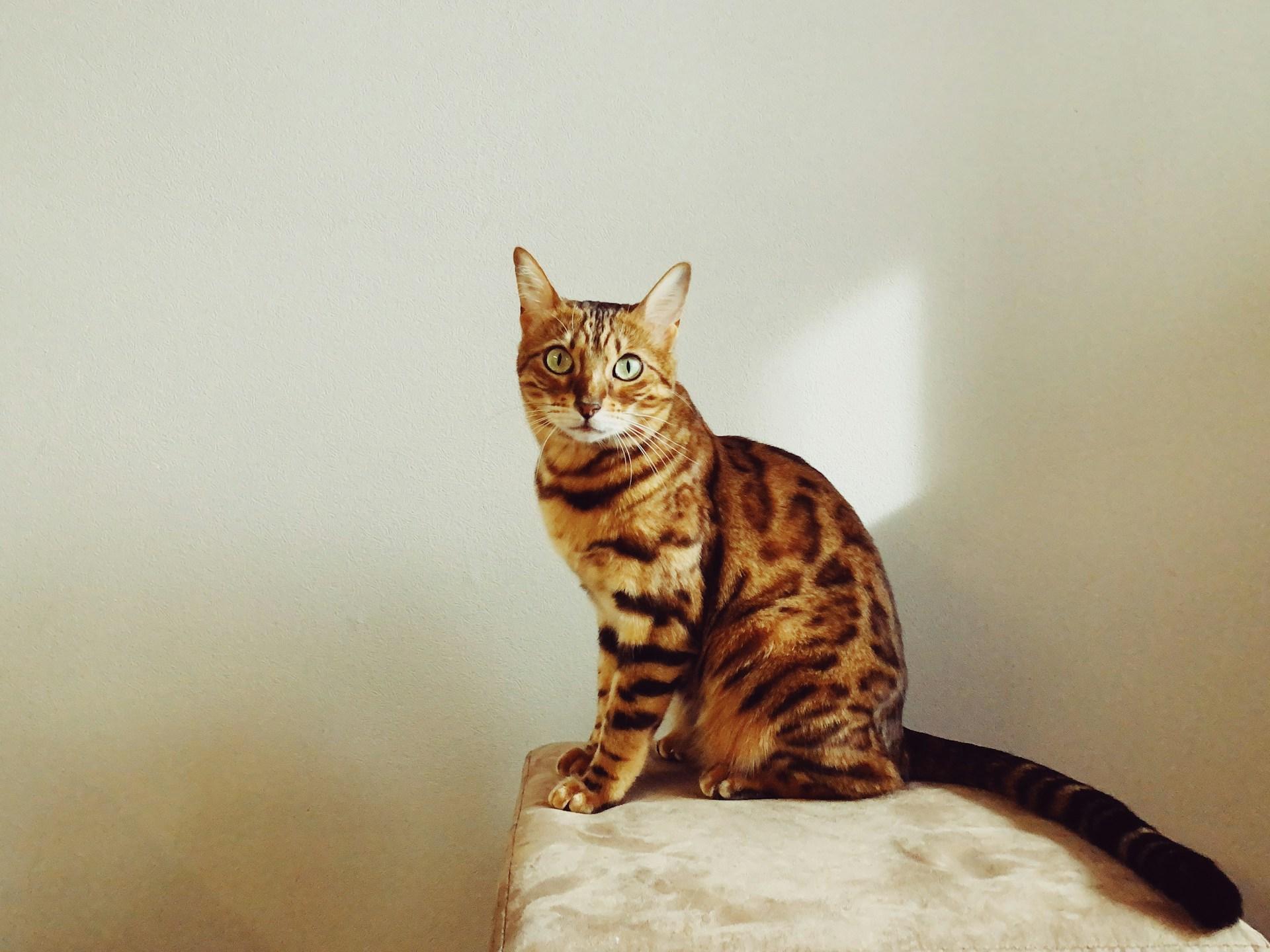
June 20, 2024
PetSafe® Expert
PetSafe® Guest
Bengal Cat Breed Overview
The Bengal cat is a distinct and highly sought-after breed known for their leopard-like spots and lively behavior. Originally bred from a cross between domestic cats and the Asian leopard cat, the Bengal stands out with its vivid coat patterns and energetic personality. These traits make Bengals particularly appealing to cat lovers who enjoy engaging pets.
This breed is well-suited for families and active individuals, as Bengals require stimulation and space to explore. They are recognized by leading cat associations and are prized for their unique combination of wild looks and friendly temperament.
History
The Bengal cat's history is as intriguing as their appearance. The breed originated in the 1960s when Dr. Jean Mill, a geneticist, first crossed a domestic cat with a wild Asian leopard cat. Her goal was to create a cat with the leopard’s wild appearance and the temperament of a domestic feline. Through years of selective breeding, the distinctive Bengal breed was refined and popularized.
The name "Bengal" itself is derived from the scientific name of the Asian leopard cat, Prionailurus bengalensis. The breed gained formal recognition in the mid-1980s and has since become a favorite among cat enthusiasts due to its exotic look and dynamic personality.
Bengals were bred not only for their appearance but also for their friendly disposition. They are more than just beautiful pets; they are a testament to the successful combination of wild and domestic traits, resulting in a sociable, healthy, and robust cat that fits well into family life and the show ring alike.
Appearance

Credits: Igor Karimov 🇺🇦 / Unsplash
The Bengal cat is recognizable by their spotted or marbled coat that closely resembles that of leopards. The coat can come in various colors, including brown, silver, and snow, each marked with unique patterns ranging from rosettes to spots and stripes. The fur is short, dense, and incredibly soft, adding to the Bengal’s tactile appeal.
Bengals are medium to large cats with a muscular build that reflects their high energy levels and agility. They possess a striking facial structure marked by high cheekbones, rounded ears, and piercing eyes that can be green or gold, contributing to their wild, exotic look.
Their athletic build is not just for show; it enables Bengals to perform impressive leaps and sprints, making them as agile as they are beautiful. Their physical capabilities are matched by a need for regular physical activity, making them ideal pets for those who can provide interactive play and space for exercise.
Temperament
Bengal cats are known for their lively, curious and engaging temperament, making them an excellent choice for active families or individuals seeking a playful and affectionate companion.
Bengals thrive in environments where they can participate in daily activities and often seek attention and interaction. Known for their unique vocalizations, Bengals communicate with their owners through chirps and meows, creating a special bond of understanding and connection.
Bengals can be compatible with other pets, including dogs if they are properly introduced and socialized from a young age. They're also particularly good with children, displaying patience and playfulness that make them suitable for families.
Behavior
Bengals are natural explorers who thrive in environments that offer ample opportunities for climbing and playing. They have exceptional jumping abilities, and reaching high cabinets or shelves is not uncommon, so creating a safe and enriching vertical space is crucial for their well-being. Another interesting aspect about Bengals is that, unlike many other cat breeds, they are fascinated with water and may play in sinks or bathtubs.
Bengals' curious and playful natures require engaging activities to stimulate their minds. Otherwise, they may exhibit unwanted behaviors such as scratching furniture or excessive vocalization. To prevent this, play with your cat regularly and provide automated cat toys when they have to be left alone for extended periods.
Training Bengals with positive reinforcement techniques can be very effective, especially when it includes rewards like treats or playtime. They respond well to such methods and it enhances their natural cleverness, making them more engaging pets.
Diet
The diet of a Bengal cat should be carefully considered to maintain their health and vitality. Bengals require a balanced diet rich in proteins to support their muscular build and active lifestyle. High-quality commercial cat food that meets the nutritional levels established by the AAFCO is generally recommended. However, some Bengal owners choose to incorporate raw or homemade diets to mimic a more natural feeding regime, though this should always be done under veterinary guidance.
Bengal cats can be more sensitive to certain foods, and it's crucial to monitor their reaction to new diets. Always ensure fresh water is available, particularly if your Bengal is on a dry food diet. Cat fountains can encourage them to drink more water, which is beneficial for preventing urinary tract issues—a common concern among cats.
It is also important to regulate the amount of food to prevent obesity, especially as Bengals can easily gain weight if their food intake is not matched with their activity level. Regular check-ups with the vet can help keep track of their health status and dietary needs as they age.
Health
Bengal cats are generally robust and healthy, but like all breeds, they have predispositions to certain health conditions. Awareness and proactive management of these potential issues are key to maintaining their well-being. Some common health concerns for Bengals include hypertrophic cardiomyopathy (HCM), which is a form of heart disease, and progressive retinal atrophy, a genetic condition that can lead to blindness.
Regular veterinary check-ups are crucial to early detection and management of these conditions. It’s also important to ensure that Bengals are kept up to date with vaccinations and parasite control to prevent common feline illnesses.
Maintain cleanliness with ease using self-cleaning litter boxes, which help reduce odor and mess. This not only supports the overall health of your Bengal but also simplifies the daily maintenance of their environment.
Genetic testing of Bengal cats can provide valuable insights into their health predispositions. Responsible breeders typically perform these tests and are transparent about the health of their breeding animals. Potential owners should ask for health clearances to ensure the long-term health of their pet.
Maintaining a healthy weight is also vital for Bengals. Their active nature usually helps in this regard, but it’s important to monitor their exercise and diet to prevent obesity, which can exacerbate other health issues.
FAQs
What is the cost of a Bengal cat?
Bengal cats can vary significantly in price depending on their breeding. Pet-quality Bengals usually cost between $1,000 and $2,000, while show-quality cats from distinguished breeding lines can cost upwards of $2,500. Factors influencing the price include the cat's age, its markings and colors, and whether it is spayed or neutered.
What is the lifespan of a Bengal cat?
Bengal cats are known for their longevity, typically living between 12 to 16 years. Proper care, a balanced diet, and regular veterinary check-ups can help ensure they live a full and healthy life.
Are Bengal cats good house pets?
Yes, Bengal cats make excellent house pets for the right families. They are particularly suitable for owners who can provide lots of interactive play and mental stimulation. Bengals are social creatures that form strong bonds with their families but can be a bit too energetic for very young children or older individuals who prefer a more sedate companion.
Lead image credits: Paul Hanaoka / Unsplash
Get Email Updates
Subscribe to the latest news, promotions, & more from PetSafe® brand.
Sign up today for the latest news, promotions, and more from PetSafe® brand.








